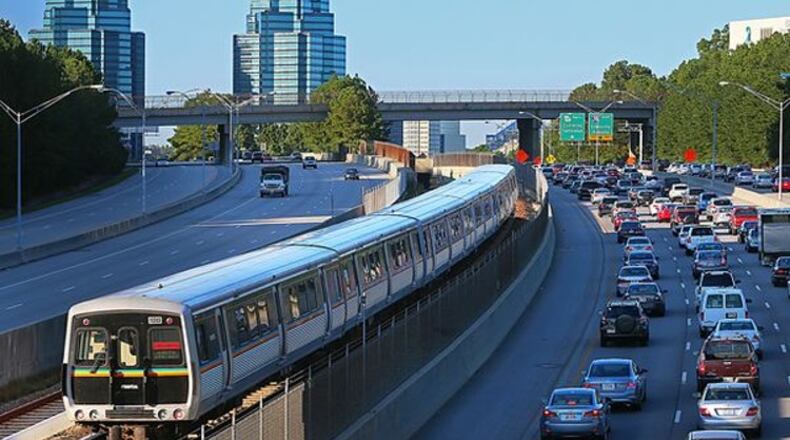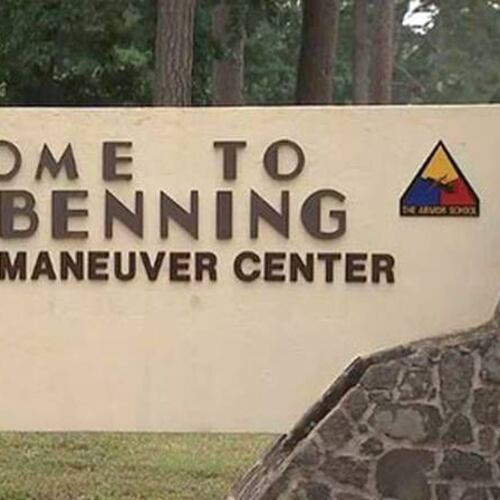A proposal to be unveiled in the state Senate this week would allow 13 metro Atlanta counties to approve sales taxes to expand mass transit services – but only if they agree to let MARTA operate those services.
The proposal also would consolidate transit planning and construction for metro Atlanta under a new board under the Georgia Regional Transportation Agency. The new board would have to approve the list of projects for any referendum put to voters in any county in the region.
State Sen. Brandon Beach, chairman of the Senate Transportation Committee, has not finalized all aspects of the bill he plans to introduce this week. A big unknown: the details of state funding for mass transit projects that would be an incentive for counties to surrender some of their control over transit planning and operations.
But Beach, an Alpharetta Republican, said his goal is to create a seamless regional transit system that is not hindered by county lines.
“Gwinnett Transit works pretty good in Gwinnett. CobbLinc works pretty good in Cobb,” Beach said. “But until we get unified infrastructure planning, we’ll never have a truly regional system.”
Beach’s bill would be the year’s first formal proposal to tackle the thorny political issue of mass transit funding in metro Atlanta. But it almost certainly won’t be the last.
A House of Representatives commission spent months studying the issue last year, and House Transportation Committee Chairman Kevin Tanner, R-Dawsonville, plans to unveil his own legislation soon. His bill also is expected to tackle transit funding and governance in metro Atlanta.
Tanner told The Atlanta Journal-Constitution Monday he plans to meet with Beach this week to see if they can unite behind a common set of proposals before they unveil their respective bills. But the two largely agree on the problem they’re trying to solve.
The Atlanta region is served by a slew of transit agencies. MARTA serves Fulton, DeKalb and Clayton counties. Other counties provide their own services. And the Georgia Regional Transportation Authority provides commuter bus service in 13 counties.
Beach underscored the difficulty of navigating that system four years ago, when he took a trip from Kennesaw to Duluth that took three and a half hours.
Beach’s plan would create a new regional board to oversee transit expansion in the 13 counties served by GRTA: Cherokee, Clayton, Coweta, Cobb, DeKalb, Douglas, Fayette, Forsyth, Fulton, Gwinnett, Henry, Paulding and Rockdale.
The board would include the governor, the Georgia Department of Transportation commissioner, the MARTA CEO, Atlanta’s mayor and City Council president, and the county commission chairman and one mayor from any participating county.
Under Beach’s proposal:
*Any county in the region could impose a 1 percent sales tax for mass transit, if it’s approved by county voters. But the project list would have to be approved by the regional board. Any sales tax money raised in the county would be spent in the county.
*If voters approved the tax, the county would join the regional board, which Beach has dubbed the Atlanta-region Transit Link (ATL) Commission. The commission would funnel federal money to transit construction projects in the region.
*The counties that wanted to expand transit would also have to agree to allow MARTA to operate their transit systems. Beach said it would be more efficient to have a single agency operate the region’s transit system, rather than the existing hodgepodge of agencies or contractors.
*Beach would like to rebrand the region’s transit system “The ATL: by 2023. So while MARTA and its board of directors would continue to exist, the agency’s transit vehicles in various counties would bear the ATL logo.
Gwinnett County could be one of the first affected by the proposed legislation. Gwinnett officials may ask voters in November to approve a transit tax for a list of projects still under development.
County Commission Chairwoman Charlotte Nash declined to comment, saying she’d rather wait and read the bills after they’re introduced.
MARTA Board Chairman Robbie Ashe said there are “real efficiencies to be achieved by having a consolidation of (transit) operators.” For example, he cited the increased purchasing power of a single operator vs. numerous small operators.
But Ashe, too, said he wanted to read the legislation before commenting further.
The fate of Beach’s proposed legislation in the General Assembly is unclear. But Tanner also has endorsed consolidating transit agencies in the 13-county GRTA region, as well as state funding for mass transit capital projects.
MYAJC.COM: REAL JOURNALISM. REAL LOCAL IMPACT.
The AJC's David Wickert keeps you updated on the latest in what's happening with transportation in metro Atlanta and Georgia. You'll find more on myAJC.com, including these stories:
Never miss a minute of what's happening in Atlanta transportation news. Subscribe to myAJC.com.
About the Author
Keep Reading
The Latest
Featured


